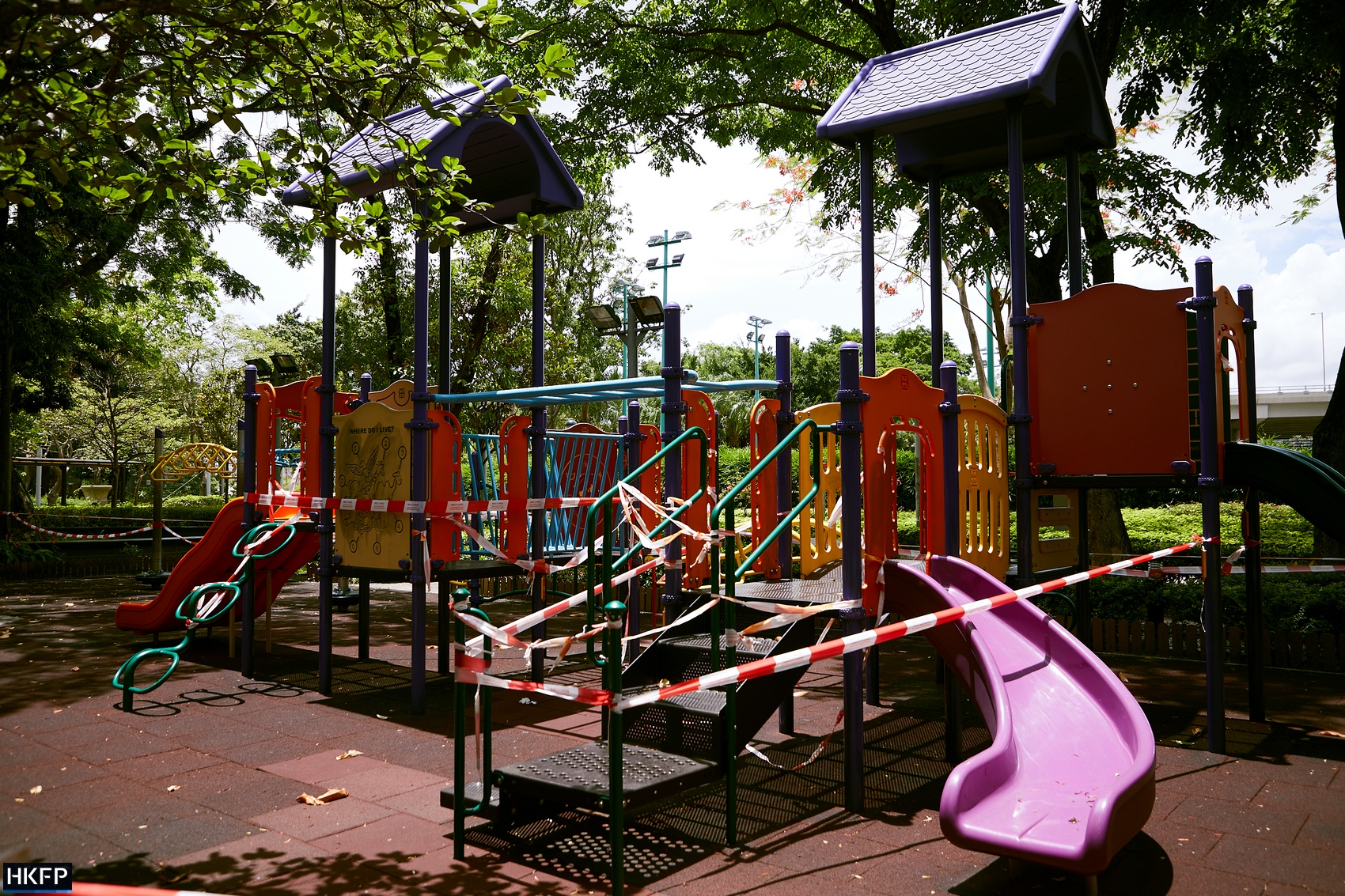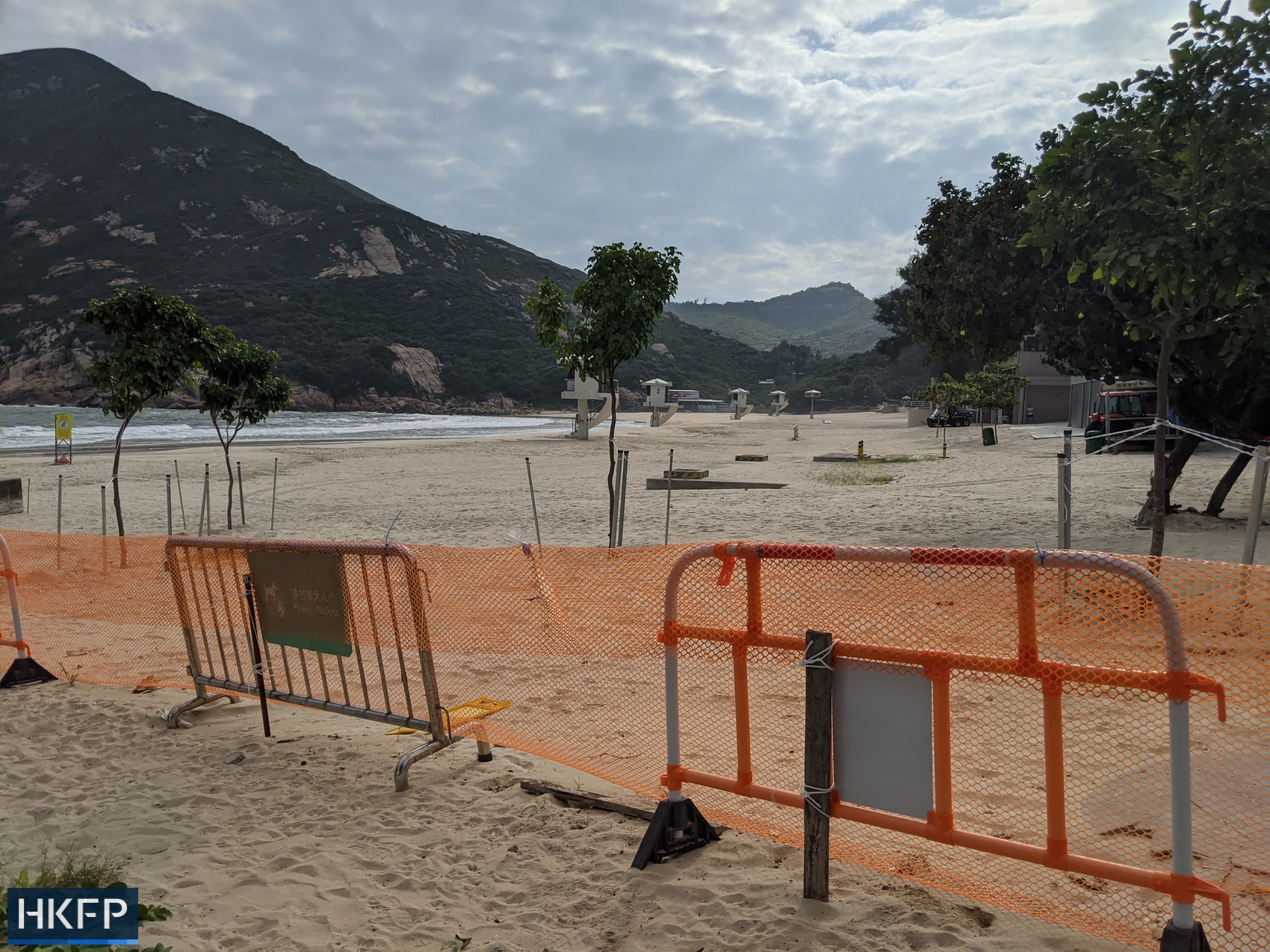Nobody in Hong Kong lives too far from a public playground. Even the areas with the highest density will have a few swings or merry-go-rounds in bright colours.
Sometimes, seniors swing slowly and lazily as if lost in a calm daze. More often, children make up mysterious rules for games they play with their friends while running around and laughing and calling for attention for their agility to be witnessed.

The other day, I walked past the silent playground in my area, all tied up in red and white plastic tape – an elaborate bonding ritual that Hong Kong has experienced on and off since the pandemic began. No games allowed here. No children and no seniors are allowed to enjoy these public open spaces while the surge of the Omicron Covid-19 variant restricts our lives in so many other ways.
But in the same day, so many other little incidents made me realise that playing, really, seems to be totally out of favour with the authorities.
At a junction, an elderly man with an erhu was being checked, fined and otherwise harassed by three policemen. Seeing him pack up his small foldable chair, put his instrument into its case (he had no annoying amplifier), and pull out his ID card was so sad that nobody watching that could have thought, even for a moment, that justice had been done.
Must the only sounds allowed really be those of traffic or jackhammers from never ending renovations and repairs?

As I made my way back home that evening, the streets were half-empty as, again, people are working from home; movie theatres, gyms and museums are closed; and every bar and restaurant has to close at 6 p.m. I walked over a long, open bridge, all decked out in Lunar New Year red lanterns festively gifted to pedestrians by the corporation that owns it, and I was surprised by a joyful noise – teenage skateboarders!
They were taking advantage of the rather empty stretch with no cars and a pleasant undulating gradient to add resistance and speed. They were also quite skilful, moving with an “I’m-real-cool” nonchalance that showed they were well aware of it. Still, their fun was stopped, quite abruptly, by the shout of a guard in uniform, hired by the company that owns the overpass, scolding them and telling they were not allowed to do that.
They stepped off their boards, caught them one-handed by the front tip, and walked past the other guard that was approaching, disappearing quickly down the stairs. It was sad – nobody could have been hurt, as there were so few of us on the bridge, and at least someone was having a bit of fun.

I don’t know what possessed me, but as I reached the two guards, trying to squeeze my eyes to show the upper part of a friendly smile, I said: “Let them play! They’re kids, there is so little to do these days for them!”
You all know how this went, right? I was lectured about Hong Kong having laws, and asked where I came from and were there no laws where I come from, and told that they were hired by the company that offers the bridge to the community to enforce the law because how would I like it if it were lawless!
I said I knew, I appreciated it, but kids, Covid, difficult times, empty bridge, nowhere to go. The barrage of absurd “what ifs” was unrelenting: what if they had hit me/someone/a child. What if nobody followed any rules. What if all skateboarders were here, where would I walk.
It escalated to what if somebody attacked me/broke into my house/drove madly – because in the authoritarian worldview, flexibility over a lesser rule has to, unavoidably, lead to chaos.

There is no point arguing – anyone with a uniform feels so powerful and seems to think that a little generosity in applying the regulations would make all the bridges in Hong Kong fall down – and there is no point appealing to understanding or compassion.
Why though? Why are beaches and parks and playgrounds all full of stern warnings of what is not allowed, leaving so little space for people, especially young people, to have the freedom to enjoy themselves?
Unicef, the UN agency for children, has a Hong Kong branch, where, among other things, it tries to promote the Right to Play – defined as a necessary part of children’s life. Together with access to education, play is seen as indispensable to healthy mental and physical development in young people.
There are other organisations around the world that try to raise awareness of this need – which shows a level of perversity in how we have collectively organised life. Left to their own devices, without too many rules to follow and guards to tell them off, children will naturally engage in play.

Both Hong Kong and China are signatories to the United Nations Convention on the Rights of the Child, and the Hong Kong government established a Commission on Children in 2018. Events seem to have taken precedence over this commitment – as we can see from the prison sentences inflicted even on children (defined, in this context, as up to 18 years of age) from 2015 to this day.
Yet here we are: neither seniors with an instrument nor children wishing to toboggan themselves into merriment, let alone teenagers being teenagers, are allowed to play. Tough institutional self-appointed mothers proudly apply their tough love, and seemingly oblivious to the mental health crisis that is sweeping through our beloved city, impact young and old the most.
Support HKFP | Policies & Ethics | Error/typo? | Contact Us | Newsletter | Transparency & Annual Report | Apps
| HKFP is an impartial platform & does not necessarily share the views of opinion writers or advertisers. HKFP presents a diversity of views & regularly invites figures across the political spectrum to write for us. Press freedom is guaranteed under the Basic Law, security law, Bill of Rights and Chinese constitution. Opinion pieces aim to point out errors or defects in the government, law or policies, or aim to suggest ideas or alterations via legal means without an intention of hatred, discontent or hostility against the authorities or other communities. |
Help safeguard press freedom & keep HKFP free for all readers by supporting our team

More HKFP OPINION:
HKFP has an impartial stance, transparent funding, and balanced coverage guided by an Ethics Code and Corrections Policy.
Support press freedom & help us surpass 1,000 monthly Patrons: 100% independent, governed by an ethics code & not-for-profit.










